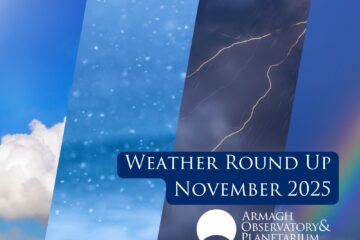DECEMBER 2023 MUCH WARMER, WETTER AND DULLER THAN AVERAGE. 2O23 WARMEST YEAR ON RECORD AT ARMAGH, THIRD WETTEST YEAR ON RECORD, AND SLIGHTLY SUNNIER THAN AVERAGE
Armagh Observatory reports that December 2023 was much warmer than average, wetter than average, and slightly duller than average. Calendar year 2023 was the warmest year on record at Armagh, much wetter than average, and slightly sunnier than average.
The mean temperature this December was approximately 7.3 C (45.2 F), making this the warmest December at Armagh for eight years, that is, since the very warm December 2015 (7.8 C), and the tenth warmest December at Armagh on record. December 2023 was 2.7 C warmer than the 225-year (1796-2020) long-term December average at Armagh (4.64 C) and 2.1 C warmer than the most recent (1991-2020) 30-year average (5.23 C).
Except for December 2022 and July 2023, each month since June 2021 has been warmer than the month’s corresponding most recent (1991-2020) 30-year average. A year ago, this led to a record breaking 2022 mean annual temperature (10.8 C). This year, the mean annual temperature for 2023 (11.1 C) surpassed the previous record by a large margin. The six warmest calendar years at Armagh are now 2023 (11.1 C), 2022 (10.8 C), 2007 (10.6 C), 2021 and 2006 (both 10.5 C), and 1949 (10.4 C). That temperature records are now being made with increasing frequency is a strong signature of a changing climate.
The three highest maximum air temperatures this December, notionally the three warmest meteorological days (representing a 24-hour period starting at 09:00 GMT), were 13.0 C, followed by 12.8 C and 12.4 C. These highest maximum temperatures were respectively attributed to the 23rd, 17th, and 26th December, though in each case the maximum daily temperature in fact occurred the following morning before 09:00 GMT, that is, during the mornings of the 24th, 18th, 27th. Such discrepancies in the date when a meteorological day’s maximum temperature occurs happen on average nearly a quarter of the time in December at Armagh.
The three lowest maximum air temperatures, notionally the three coolest days, were 3.6 C, 3.7 C, and 5.0 C, which occurred respectively during the afternoons of the 3rd, 2nd and 1st of December. Taking the 31 December days together, the monthly average of the daily maxima was approximately 9.7 C, the equal seventh warmest such result (shared with 1953, 1942, and 1862) on record at Armagh.
The highest minimum air temperature, notionally the warmest night, was 10.7 C attributed to the 18th, though it in fact occurred shortly after the 09:00 GMT time of readings on the 17th. This was the highest minimum December temperature at Armagh for eight years, that is, since 11.1 C was recorded on both the 2nd and 17th of December 2015. The second and third highest minimum air temperatures this December were both 9.9 C, conventionally attributed to the 17th though in fact these temperature minima occurred around 09:00 GMT on the 16th and 23rd. Such discrepancies in the date of a meteorological day’s minimum temperature happen on average roughly half the time during December at Armagh.
The lowest minimum air temperature, notionally the coolest night, was -3.2 C on the 1st, followed by -0.8 C conventionally attributed to the 2nd and 4th. In the first of these, the value -0.8 C in fact occurred shortly after the time of observations at 09:00 GMT on the 1st. Considering the run of daily minimum temperatures, the monthly average was 5.0 C, the fourth warmest such result on record at Armagh.
There were nine ground frosts this month, that is, days when the grass minimum thermometer recorded less than or equal to zero Celsius. The three coldest such frosts were -9.6 C on the 1st, -6.0 C on the 4th, and -5.4 C on the 6th. There were just four air frosts, the three previously mentioned and 0.0 C which although attributed to the 5th in fact occurred around 09:00 GMT on the 4th.
Total precipitation was 102.35 mm (4.03 inches) including 5 trace values, and therefore 102.1 mm if trace values are ignored. This was approximately 31% more than the 183-year (1838-2020) long-term average December precipitation at Armagh (78.2 mm) and 26% more than the most recent (1991-2020) 30-year average (81.4 mm). This was the wettest December at Armagh for two years, that is, since December 2021 (110.85mm).
The wettest day was the 26th with 16.6 m (0.65 inches) of rainfall, followed by 13.5 mm on the 29th and 12.6 mm on the 11th. Partial rainbows were seen on the morning of the 19th and the afternoon of the 24th. No snow fell this month nor, despite four named storms affecting Britain and parts of Northern Ireland, namely Elin, Fergus, Pia, and Gerritt, were there any gales or exceptionally high daily rainfall totals at Armagh.
With a total of 30.2 hours of strong sunshine, December 2023 was rather duller than average, the dullest at Armagh for two years, that is, since December 2021 (27.8 hours of strong sunshine). The sunniest day was the 13th, with 5.9 hours of strong sunshine, followed by the 29th with 3.9 hours and the 5th and 28th both with 3.7 hours.
Calendar year 2023 was noteworthy not just because of its exceptionally high mean temperature and total rainfall, but also owing to an exceptionally wet March, October, autumn and early winter, and the dates of its warmest days.
With a mean temperature of 11.1 C, this was the warmest year on record at Armagh, that is, since daily weather records began around 1795. This surpassed the previous record by a large margin. The six warmest years at Armagh are now 2023 (11.1 C), 2022 (10.8 C), 2007 (10.6 C), 2021 and 2006 (both 10.5 C), and 1949 (10.4 C).
June 2023 was an exceptional month: the warmest June on record at Armagh, the sunniest for 14 years and the driest for eight years. The warmest day, namely 28.5 C on the 13th, which occurred at the start of a 4-day heatwave, was the warmest day of the summer, holding its position as the warmest day of the year until equalled by 28.5 C attained at Armagh on the 8th of September.
This high September temperature occurred during an exceptionally warm spell near the beginning of the month that lasted for a week from the 4th to the 10th. During this time every day except the 9th (maximum temperature 24.8 C) exceeded the threshold (25.0 C) for a heatwave, this being only the second September heatwave on record at Armagh. In part owing to the warm September, the third warmest on record at Armagh, 2023 also included the fifth warmest autumn on record at Armagh.
Total precipitation during 2023 amounted to 1052.2 mm including 52 trace values, that is, 1049.6 mm if trace values are ignored. This is nearly 30% more than the 183-year (1838-2020) long-term average (816 mm) at Armagh and the most recent (1991-2020) 30-year average (825 mm). This was the third wettest year on record at Armagh despite a drier than average winter 2022/2023. A dry February was followed by the wettest March on record and the wettest spring for 21 years; and in turn by a wetter than average summer, the wettest October on record, and the fourth wettest autumn. The six wettest years at Armagh are now 1852 (1121.9 mm), 2002 (1065.7 mm), 2023 (1052.2 mm), 1928 (1043.5 mm), 1958 (1040 mm), and 1966 (1032.4 mm).
Calendar year 2023 recorded 1320.3 hours of strong sunshine, nearly 5% more than the 140-year (1881-2020) long-term average at Armagh (1261.6 hours) and 3% more than the most recent (1991-2020) 30-year average (1281.0 hours). Overall, the year was slightly sunnier than average, a duller than average spring not quite compensating for a sunnier than average summer and autumn.
These data refer to observations at Armagh Observatory, which has been recording the weather at Armagh since 1795.
For further information, please contact:
Professor Mark E. Bailey
Emeritus Director of Armagh Observatory
Armagh Observatory and Planetarium
College Hill
Armagh
BT61 9DG
Tel: 028-3752-2928
E-mail: mark.bailey@armagh.ac.uk





0 Comments